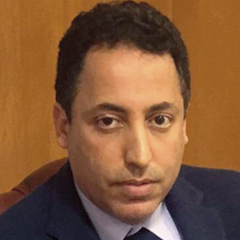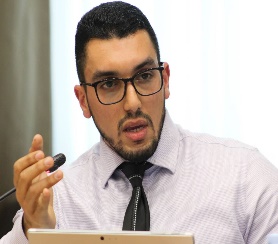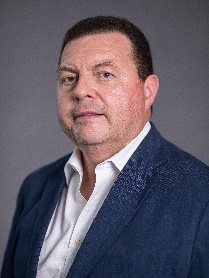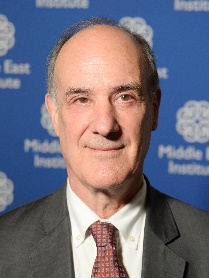A Fragmented Society: The Internal Dynamics of Libya’s Conflict
Live broadcast
While most discussions about the Libyan crisis revolve around geopolitics and international interference, internal divisions within Libya’s civil society and political institutions have also played a fundamental role in destabilizing the country since the fall of Muammar Gaddafi in 2012. Governance in Libya is fragmented with very few truly national actors. It also continues to lack political institutions that are seen by all Libyans as legitimate. The ongoing conflict consists of many contending local and tribal players, including spoilers who have demonstrated opposition to either peace or reconciliation except on the basis of total victory by their group.
What are the major obstacles to stabilization? How can Libya approach the establishment of political institutions? In what ways can the international community support a Libyan-led peace process? The Policy Center for the New South, the Middle East Institute and the Regional Program Political Dialogue South Mediterranean of the Konrad Adenauer Foundation are pleased to jointly host a group of experts to discuss these questions and more in a closed roundtable format.
The roundtable will be broadcast live here.
Keep me informed-

Youness Abouyoub, Director, Governance and State-Building Division for the MENA Region, United Nations; Former Senior Political Advisor to the Special Representative of the UN Secretary General to Libya
Former head of the political office of the UN Under-Secretary General for Conflict Prevention and senior political advisor to the UN Secretary General Special Envoy to Burundi. He directed the political office of the UN Secretary General Special Envoy to Yemen and acted as his senior special advisor. He also was the senior political officer in charge of the regional affairs in the UN political mission to Libya (UNSMIL) and head of office of the special representative of the UN Secretary General in Libya. He also served as Senior Regional Expert in the UN Security Council Panel of Experts on Sudan (Darfur) and worked for the United Nations Department of Political Affairs (New York) and the United Nations Environment Program in Nairobi. Mr. Youness Abouyoub holds a PhD in political sociology (Paris Sorbonne/Columbia University) and MA in Geopolitics and Law
-

Emaddine Badi, Non Resident Senior Fellow, Atlantic Council
Emadeddin Badi is a Nonresident Senior Fellow with the Middle East Program at the Atlantic Council, where he focuses primarily on U.S and European policies towards Libya and the wider geopolitical implications of the conflict. Previously, he was a nonresident scholar at the Counterterrorism and Extremism Program at the Middle East Institute.
Badi is an independent consultant who has worked with multiple development and international organizations with a focus on Libya. From 2015 to 2018, he gained hands-on experience programming the conflict-sensitive implementation of a flagship stabilization initiative implemented across Libya for UNDP. He also provides geopolitical risk analysis to private sector stakeholders on political risk and economic and development issues in Libya.
Badi has also worked on multiple research and policy-oriented projects with various institutions, with an extensive focus on Libya’s non-state actors. Most recently, he co-authored a paper on the “Development of Libya’s Armed Groups Since 2014 – Community Dynamics and Economic Interests” with the Royal Institute of International Affairs – Chatham House. He is also currently affiliated with the School of Transnational Governance at the European University Institute in Florence, Italy, where he focuses on EU policy towards Libya.
Badi is a frequent commentator on Libyan development and his articles and analysis have been published on Chatham House, the Carnegie Endowment for International Peace, the Middle East Institute, the World Politics Review, War on the Rocks, and many others.
Badi holds a bachelors in Business and Economics from the University of Essex, a bachelors in French language from the University of Tripoli in Libya as well as a postgraduate degree in Violence, Conflict and Development from the School of Oriental and African Studies in London, UK. He is fluent in English, Arabic and French.
-

Mohamed Dorda, Co-Founder, Libya Desk
Mohamed Dorda has co-founded Libya Desk, a specialist geopolitical risk consultancy that aims to provide unbiased, objective and reliable analysis on what is happening in Libya.
-

Mohamed Eljarh, Co-Founder, Libya Outlook for Research and Consulting
Mohamed Eljarh is a Libyan affairs specialist. He is the co-founder of Libya Outlook for Research and Consulting. Previously, he was a fellow with the Atlantic Council focusing on Libya, and he was Foreign Policy Magazine's Libya contributor 2014-2017. He published two book chapters and numerous Think Tank reports and policy briefs on post-Qaddafi Libya. Eljarh is a contributor to Fikra Forum.
-

Mary Fitzgerald, Independent Journalist
Mary Fitzgerald is a writer, researcher and consultant specialising in the Euro-Mediterranean region with a particular focus on Libya. Arriving in Benghazi days after anti-Gaddafi protests erupted there in February 2011, she spent several months on the ground in Libya reporting on the uprising that followed. She has worked on Libya since then and lived there in 2014.
She has conducted research on Libya for the International Crisis Group (ICG), the European Council on Foreign Relations (ECFR), the European Institute of the Mediterranean (IEMED) and the European University Institute (EUI) among others. She has consulted for a number of international organisations working in Libya including in the areas of conflict mediation, civil society and youth empowerment.
She has worked on wider initiatives with UNESCO, the Anna Lindh Foundation, the British Council and other cultural organisations. She is a trustee of Friends of Europe.
Her work has appeared in publications including the Economist, Foreign Policy, the New Yorker, the Washington Post, the Financial Times, the Guardian, Monocle, and Roads & Kingdoms. She is a contributing author to an edited volume on the Libyan revolution and its aftermath published by Hurst/Oxford University Press.
Mary is a frequent contributor to international broadcast media such as the BBC (including BBC Radio 4’s From Our Own Correspondent), NPR and RFI. She has also worked on a number of award-winning radio documentaries for the BBC, one of which – on post-conflict Northern Ireland – won a Gold Sony Radio Academy Award.
She has given talks and participated in panel discussions on Libya at the University of Oxford, the London School of Economics, UCLA, Chatham House, Carnegie, Milan’s ISPI and several other institutions in Europe and the US.
As a journalist, Mary began her career reporting on post-conflict Northern Ireland, covering paramilitary feuds and the sectarianism that endured beyond the 1998 peace agreement. She spent seven years as a roving foreign correspondent for the Irish Times, reporting from more than 40 countries including Egypt, Saudi Arabia, Syria, Lebanon, Iran, Sudan, Somalia, Mali, the Democratic Republic of Congo, Pakistan, Afghanistan, India and Burma. She has also reported on conflict and post-conflict dynamics in Darfur, Sierra Leone, South Sudan, Chad, Iraq, Bosnia, Palestine/Israel, Kosovo and Spain’s Basque region. She is a former Laurence Stern Fellow at the Washington Post.
-

Len Ishmael, Senior Fellow, Policy Center for the New South
Dr. Len Ishmael is the former Ambassador of the Eastern Caribbean States to the Kingdom of Belgium and European Union, and past President of the seventy-nine-member African, Caribbean & Pacific (ACP) Committee of Ambassadors in Brussels. She is a former Director for the United Nations Economic Commission for Latin America & the Caribbean; Director General for the Organization of Eastern Caribbean States, Alternate Governor for the World Bank and Director for the Foundation - Leadership for Environment & Development of the Rockefeller Foundation in New York City. She is a German Marshall Fund Fellow (GMF) and Distinguished Visiting Scholar, and a Senior Fellow at the Policy Center for the New South (Morocco). Dr. Ishmael is also The Fletcher School Tufts University GMAP Endowment Fellow and is a member of The Fletcher School of Law and Diplomacy GMAP Advisory Council. She was an expert witness for the House of Lord’s inquiry into Commonwealth efforts post Brexit to lift countries out of poverty through trade. She is also the Special Advisor (Europe) to the Vice Chancellor of the University of the West Indies. Dr. Ishmael was conferred a Doctoral Degree in Development Planning/Development Economics from the University of Pennsylvania, in 1988 and Global Master of Arts from the Fletcher School of Law and Diplomacy, Tufts University in 2018. Her other degrees include a Master’s in Urban Planning from City University, New York City, and a Bachelor’s Degree in Economics & Geography from the University of the West Indies, Jamaica. Dr. Ishmael operates her practice from Brussels specializing in European affairs, the EU-ACP partnership, EU-Africa relations, EU-USA Trans-Atlantic relations, China in Europe, Latin America and the Caribbean, political and corporate diplomacy, and international development corporation. Her latest publication: Soft Power & Global Ambition: The Case of China’s Growing Reach in Europe was published by the Fletcher Forum’s World Affairs Vol.34:1 Winter 2019 print edition.
-

Karim Mezran, Resident Senior Fellow, Atlantic Council
Karim Mezran is director of the North Africa Initiative and resident senior fellow with the Rafik Hariri Center and Middle East programs focusing on the processes of change in North Africa. As a distinguished Libyan-Italian scholar, Dr. Mezran brings enormous depth of understanding to the transition in Libya and elsewhere in the region. In addition, Dr. Mezran is currently an adjunct professor of Middle East studies at the School of Advanced International Studies (SAIS), where he is teaching courses on the history and politics of North Africa. From 2002 to 2012, he was the director of the Center for American Studies in Rome. His analyses on the Middle East and North Africa have been widely published in Italian- and other-language journals and publications. He is the co-editor of three volumes published with Dr. Arturo Varvelli of the Italian think tank ISPI entitled Foreign Actors in Libya’s Crisis (2017), The Arc of Crisis in the MENA Region: Fragmentation, Decentralization, and Islamist Opposition (2018), and The MENA Region: A Great Power Competition? (2019). He is the co-author of a book on Libya in Italian, entitled Libia: fine o rinascita di una nazione? with Dr. Varvelli (Donzelli Editore 2012). He is also the author of a book in English on the identity crisis in the Middle East and North Africa, entitled Negotiation and Construction of National Identities (Martinus Nijhoff Publishers 2007). Dr. Mezran holds a PhD in international relations from SAIS; a JD in comparative law from the University of Rome (La Sapienza); an LLM in comparative law from The George Washington University; an MA in Arab studies from Georgetown University; and a BA in management from Hiram College.
-

Tarek Megerisi, Policy Fellow, North Africa and Middle East Programme, European Council on Foreign Relations
Tarek Megerisi is a policy fellow with the North Africa and Middle East programme at the European Council on Foreign Relations. He is a political analyst and researcher who specialises in Libyan affairs and more generally politics, governance and development in the Arab world.
Megerisi started his career in Tripoli, Libya with the Sadeq Institute and various INGOs providing diverse research and democratisation assistance to Libya’s post-revolutionary authorities between 2012-2014.
Megerisi returned to London in 2014 and has since been working freelance as an analyst and researcher, advising on Libya policy to a range of international missions to Libya, commentating on Libyan developments for publications like Foreign Policy, and co-authoring policy briefs or assisting with the Libya programming of a variety of think-tanks. He has also authored commissioned papers for organisations such as WPF and the Legatum Institute and contributed to wider publications for journals like ISPI. In 2017 he was part of the UN OHCHR team to update the Pinheiro Principles on Home, Land & Property Rights for the Middle East.
-

Amal Obeidi, Associate Professor of Comparative Politics, Department of Political Science, Faculty of Economics, University of Benghazi, Libya
Amal S M Obeidi is Associate Professor of Comparative Politics in the Department of Political Science, Faculty of Economics at University of Benghazi, Libya. Currently she is associate researcher in the DFG-funded research project entitled “Political in the Making” at Germany’s University of Bayreuth. Dr. Obeidi was two years as a Dean of the Faculty of Economics of University of (Benghazi), where she was also the head of the Political Science Department. Dr Obeidi also was head of the Studies and Research unit at the Research Centre of the University of Benghazi from 2006-2008. Dr. Obeidi’s publications include Political Culture in Libya (2001), The Political Elites in Libya (2008), The National Security in Libya: Challenges of the Transitional Period (2012). The Impact of the Revolution and the Transitional Period on Women’s Empowering Policies in Libya (2013), “From Forced Reconciliation to Recognition: The Abu Salim Case in Historical Perspective” (in: Jan Michiel Otto et. al. (eds), Searching for Justice in Post-Gaddafi Libya: a Socio-Legal Exploration of People’s Concerns and Institutional Responses at Home and from Abroad, Leiden 2013). and “Identity in Libya: Orientations of Loyalty and Identification“, Benghazi University Research Center (2015); Political Socialization in Post Qhadafi Libya: Analysis Study of the Values of the Co-Existence in the Primary School Curriculum in Social Cohesion in Libya and Elsewhere (Tunisia, 2017). Local Reconciliation in Libya: An Exploratory Study on Traditional Reconciliation Processes and Mechanisms since (2011, UNDP). She holds a Ph.D. from Durham University, UK, in Middle Eastern Politics (1997).
-

Jason Pack, Nonresident Scholar, Middle East Institute; Founder, Libya-Analysis LLC
Tarek Jason Pack is a consultant, author, and commentator with over two decades of experience living in, and working on, the Middle East. In 2004, he was a Fulbright Scholar in Syria. In 2008, he moved to Tripoli to assist Western businesses in reentering Libya amidst the late Qadhafi-era reforms. In 2011, Jason created Libya-Analysis LLC — a consultancy organization producing evidence-based analysis, forecasting, business intelligence, and commercial research on Libya. In 2015, Jason founded Eye on ISIS in Libya — a non-profit 501c3 monitoring service detailing the group’s history, its interactions with other jihadi actors, and Western actions toward the group. In 2016, he became the Senior Libya Analyst at CRCM North Africa, a German strategy firm. In 2017-18, he served as Executive Director of the U.S.-Libya Business Association. Currently, he is working on a popular book exploring what Libya’s dysfunctional economic structures and its ongoing civil war tells us more broadly about globalization and the geopolitics of the 21st century.
In addition to academic and policy writing focused on Libya, he publishes about oil markets, US politics, wine tasting, and travel. His articles have appeared in The New York Times, The Wall Street Journal, The Spectator, The Financial Times, The Petroleum Economist, The Guardian, Foreign Policy, and Foreign Affairs. He was the 2018 World Champion of Doubles Backgammon and is the CEO of Birthplace of Wine Experience.
-

Jonathan Winer, Nonresident Scholar, Middle East Institute; Former United States Special Envoy for Libya
Jonathan M. Winer has been the United States Special Envoy for Libya, the deputy assistant secretary of state for international law enforcement, and counsel to United States Senator John Kerry. He has written and lectured widely on U.S. Middle East policy, counter-terrorism, international money laundering, illicit networks, corruption, and U.S.-Russia issues. In 2016, Winer received the highest award granted by the Secretary of State, for “extraordinary service to the U.S. government” in avoiding the massacre of over 3,000 members of an Iranian dissident group in Iraq, and for leading U.S. policy in Libya “from a major foreign policy embarrassment to a fragile but democratic, internationally recognized government.” In 1999, he received the Department’s second highest award, for having “created the capacity of the Department and the U.S. government to deal with international crime and criminal justice as important foreign policy functions." The award stated that "the scope and significance of his achievements are virtually unprecedented for any single official."









